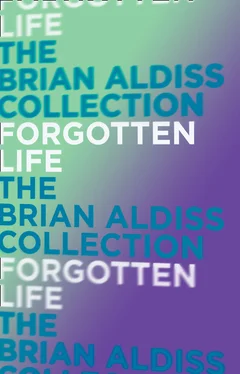Clement’s training, as well as his analytical disposition, enabled him to see how reluctant he was to face his own lack of involvement in Joseph’s affairs. He had been far – often physically far – from the crucial events in Joseph’s career.
He took from the drawer of his desk an envelope containing a letter and photograph Joseph had sent him in the early eighties. He was sorry to think that they had arrived in response to his duplicated form. When he was embarking on the research required for Adaptability, Clement had sent out the forms to large numbers of people, inviting memories of the beginning of the war in 1939. He had been impersonal; his brother’s response had been personal and immediate.
Joseph had taken the printed question literally. His reply, in his hasty handwriting, concerned only the declaration of war, when he had just turned thirteen. On that day, 3rd September 1939, when Britain and France declared war on Nazi Germany, his sister Ellen was almost nine; Clement was little more than a toddler. Their parents, Ernest and Madge Winter, were in their late thirties or early forties.
Madge Winter had taken the photograph on the family box Brownie. It was in black-and-white, with a white margin. Time had made it crisp and slightly concave. In Joseph’s writing on the back of the snap was the legend, ‘Taken an hour after war was declared.’
The family was standing by the old square Morris. Ellen, in a check print dress, was holding baby Clement and grinning. Joseph, in holiday shorts, was wearing a large cap and grinning. Father looked sternly out of the car window, elbow and forearm disclosing a rolled-up shirt sleeve. His expression suggested he was mulling over his favourite phrase, ‘That’s what you get …’ Behind the car, part of a ruin could be seen. They had been holidaying on the north coast of Cornwall, by Tintagel, King Arthur’s castle.
‘I respond to your form at once, because the more obstinately 1939 gets forgotten by the population at large, the more obstinately I remember it,’ Joseph had written in his reply to the form.
Even there, Clement reflected, Joseph revealed his character. Good-natured, rather self-mocking, yet in some way challenging, going against the grain.
‘There was a car park on the cliff top, large and open, and almost deserted except for our Morris and someone’s caravan. The caravan was drawn up so that it enjoyed views of the Atlantic. Rather a battered old thing, if I remember rightly (does one ever remember rightly?). Father pulled up next to it. We got out and Ellen and I ran to look at the cliffs, followed by cautionary screams from mother.
‘A fat man climbed out of the caravan, strolling across to engage my father in conversation. I went over to them after a while, in order to observe the fat man at close quarters. He smoked a pipe and wore a panama hat. Also old grey flannel trousers held up by braces, unless I invent that bit. He seemed a jolly man, although he and father were talking seriously about the international situation. It was a Sunday, and father showed him something in the newspaper.
‘The fat man said that his wife had turned him out of the caravan while she prepared lunch – speaking laughingly, he added that there wasn’t room for two large people inside when she was busy. He waved to her, I remember, and the woman looked out and waved back, with an extra wave for me.
‘She was cooking sausages and mash, and had their radio tuned to the Home Service. The radio said there was to be a special announcement. “This’ll be it,” said the fat man to father, calling to his wife to turn up the volume.
‘Mother and Ellen were walking off towards the ruins with the baby – with you. I stood beside father, staring out to sea. The sun was shining. It was a beautiful day and the sausages smelt good.
‘I felt anxious. Perhaps I prayed. I was pretty religious at that age. Kids used to be. It seemed unlikely to me that Hitler would halt the invasion of Poland just because we asked him to, powerful though we believed Britain to be at that time. In a minute, up came the voice of Neville Chamberlain, to inform us that a state of war existed with Nazi Germany. The solemnity of his tone as much as the words impressed me deeply. I looked up at father. He just continued to stare out over the Atlantic. The fat man swore – politely, because I was there. His wife went on frying sausages.
‘She called her husband in for lunch after a while. I could hardly believe it. I imagined everything stopped when war began. We shook hands with the fat man. I was proud because he shook hands with me very readily and told me to do well. He dipped into a pocket and gave me sixpence before disappearing. While this comforted me father was annoyed with me for accepting it. He thought the man was common. No one had sausages for Sunday dinner, even on holiday, he said.
‘He headed for the ruins to break the news to mother. I followed. The sunlight and the sea remained completely unaltered.’
Clement folded the letter along its old crease-lines, and reinserted it in its envelope. That had been one enormous difference between him and Joseph: the war. It had for ever separated them.
His gaze alighted on the small package from his sister. As he took up his paperknife to open it, Sheila entered the room carrying the wine bottle, and sat down on his sofa.
‘How was Maureen?’
‘Oh, she’s still working to abolish marriage, the legalized way in which men suppress women.’ They both laughed. Since her separation from a drunken husband some years ago, Sheila’s friend Maureen Bowler had become a noted feminist.
‘You’ll take life easy for a few days, Sheila, darling? You need a rest after all the Green Mouth excitements in the States.’
‘Perhaps we’ll fly down and have a few days in Marbella next month, if it’s not too hot. I’m not doing anything too serious at present. But I phoned Mrs F.’
Mrs F. was Mrs Flowerbury, Sheila’s faithful secretary.
‘There’s a pile of stuff awaiting attention in my study. Mrs F. swore she was prepared to come even on Sunday.’
‘Silly woman!’
‘Well, her children are away and her husband’s got this contract in the Gulf. I think she’s glad to come here to fill in the time. As you know, some people have peculiar attitudes to time …’
They chatted and drank wine for a while, until Sheila told Clement to open up Ellen’s package.
From the wrapping he lifted seven venerable envelopes. They were accompanied by a letter from Ellen, penned in her small grey house in Salisbury on small grey notepaper.
Holding up the paper, Clement read aloud. ‘“Knowing that you are working on Brother Joseph’s papers, I am sending you seven letters which he wrote to me from India. I was only fourteen at the time, he was my idolized elder brother. The letters have become fragile with time, like the rest of us. Treasure them well. I definitely” – underlined – “want them back before long.” And she ends with love to you and me, and a P.S. saying the dog is in good health.’
‘Nothing about Jean?’ Sheila asked.
‘She doesn’t mention Jean.’ Jean was the only child of the marriage between Ellen and Alwyn Pickering. She had become divorced three years earlier and was the source of excited anxiety to her mother, in which capacity she vied with Jessie, the dog.
Of the seven envelopes Ellen had sent, two were plain. Five were official, with the words ACTIVE SERVICE printed boldly on them. All seven bore four anna stamps and Indian postmarks, dating from the time when Joseph was a soldier on his way to fight the Japanese in Burma. His age was eighteen, although he had passed himself off for a year older than he was.
‘They’re antiques!’ Sheila exclaimed.
Читать дальше










